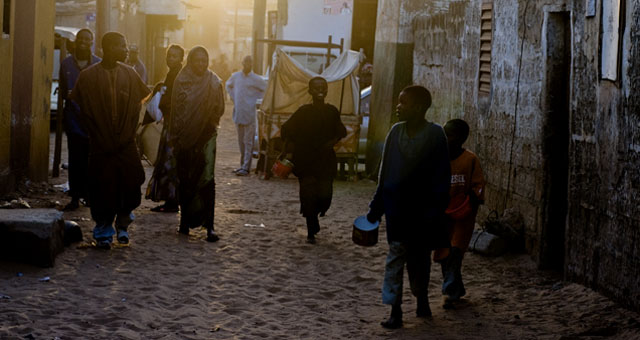Disclaimer: This article is more than 13 years old, and may not include the most up-to-date information or statistics. Please verify information with more recent sources as needed, and if you have any questions contact our Press Office.
8 September 2010
A Senegalese court’s decision to only award a six-month suspended sentence to seven Koranic teachers found guilty of forcing children to beg for their own personal financial gain has left children further at risk of abuse, says Anti-Slavery International, the world’s oldest human rights organisation.
The seven marabouts (Koranic teachers) were handed a six-month suspended sentence and a fine of 100,000 francs ($194) today (Wednesday 8 September) for forcing talibés (students) to beg while in their care at residential Koranic schools (daaras).
The Senegalese Government made it a criminal offence to force others into begging for personal financial gain in 2005, although the law has been applied very rarely and only in the cases of well publicized and extreme physical abuse of a talibé by a marabout. Those convicted under the law for child begging are liable to receive a prison sentence of between two and five years as well as a fine of between 500,000 and 2 million francs ($971 – $3,884).
An estimated 50,000 children are enslaved in this way across the country, though perpetrators are very rarely convicted of the crime. Each year thousands of poor rural families in Senegal, as well as from neighbouring countries, send boys, often under the age of ten, to the city to study in daaras.
Families send their children to study under a marabout because it is their only opportunity for an education. Their children are promised an Islamic education as well as room and board. In reality many talibés are forced by their marabout to beg and suffer serious abuse if they do not collect enough money.
Traditionally, in return for providing religious schooling marabouts rely on the charity of the public to pay for food and the upkeep of the daara. However, in recent years unscrupulous marabouts have used their position to amass a personal fortune by forcing dozens of their students to beg seven days a week.
While only a few marabouts make vast profits, our research indicates that some marabouts earn far more than is needed to maintain their daara, with a marabout controlling 50 talibés able to ‘earn’ around $25 a day, far more than the average Senegal salary of less than $2 a day.
Anti-Slavery International published research on the phenomenon of forced child begging in Senegal in 2009, and is calling on the Senegalese Government to eradicate this practice once and for all by ensuring that all children in their jurisdiction are protected from being forced to beg by marabout and have access to a more rounded education that will equip them for later life.
Catherine Turner, Child Labour Programme Co-ordinator at Anti-Slavery International, said: “Forced child begging in a very serious form of abuse and it is unacceptable that such a lenient sentence has been handed to people who enslaved children in this way. In order to eradicate this practice and protect children from further abuse it is essential that tougher sentences are handed to perpetrators of this crime.
“It is a tragedy that a parent’s desire to give their children access to an education lies behind the decision to send their loved ones into such an exploitative situation. However, the lack of accessible state schooling means for many poor families ‘free’ Koranic schools are the only viable option. Forced child begging will always exist in Senegal until the Government tackles all the root causes, including extreme poverty and lack of a viable alternative education for these children.”
For further information contact: Paul Donohoe, Anti-Slavery International Press Officer +44 (0)20 7501 8934 p.donohoe@antislavery.org
Notes for Editors
1. Anti-Slavery International is the world’s oldest human rights organisation and campaigns for the eradication of slavery, exposing current cases, supporting local organisations to release the minimum 12.3 million people in slavery, and the implementation of international laws against slavery. www.antislavery.org



